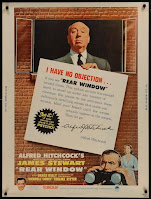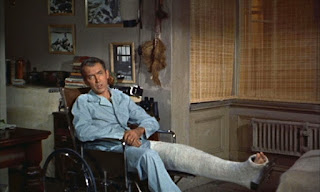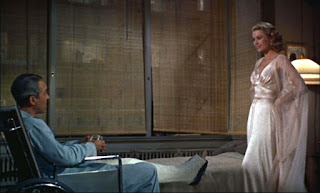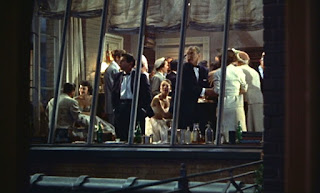The Story: One thing people always asked Alfred Hitchcock about his movies: "Why didn't they just go to the police?"
"Because it's boring" was his usual answer.
Every so often, Hitchcock would prove that point by having his people go to the police (when they weren't having to avoid them) such as what happens in Rear Window, one of Hitchcock's masterpieces.
In this movie, it's a matter of convenience: photographer L.B. Jeffries can't go to the police because he's laid up in his New York apartment with a broken leg—presumably an on-the-job accident—the very same reason he started to peer out his rear window upon his neighbors and began to suspect that one of them—a traveling salesman named Thorvald—had killed his invalid wife. He has a buddy on the force and that buddy has just left "Jeff" and his girl-friend/fashion-plate Lisa, with perfectly reasonable explanations that have put the kibosh on the inactive photographer's over-active imagination.
And they've watched when one of the neighbors—all of whom he's given churlish impertinent names to—"Miss Lonelyhearts," has fended off an attack from a would-be suitor, kicked him out of her basement flat and collapsed onto her couch in humiliated despair.
Time for some good Catholic guilt, some shame, and a re-appraisal of their actions. Hitchcock was a Catholic and he knew how much "fun" that was, so he doesn't dwell on it for too long.
But, a moral readjustment does need to be made. What Lisa and Jeff have been doing is creepy, no matter how they got into it and how hard it would be to avoid it with that VistaVision courtyard view of his. And for Lisa, the "Miss Lonelyhearts" episode reminds her of her own fruitless pursuit of Jeff, who is a selfish male and (let's face it) insane not to want to marry her. It's a reminder that they're not playing games here. These are real human beings they're amusing themselves with, watching their antics and suspecting...or wishing...the worst.
And then...after a momentary sexual tease...Hitchcock will double-down on that remorse and rather nakedly dwell on it for an extended period of time. For the watchers—and there are two sets of them—it provokes multiple reactions. For the observers inside the movie it will evoke momentary curiosity, alarm, even empathy. For the movie audience, it might provoke disdain for the director's emotional manipulation, or the feeling that the movie is momentarily directing its gaze at us and judging us.* We might even think that the director is wasting his screen-time showing it.
But, he's not. He's merely set-up his pay-off and does so in a way that's purely visual...purely (as Hitchcock would say it) "cinemah." And, so, after the level-headed police have briefly derailed the movie's train of dark thoughts...that shot of a glowing cigar in the dark puts the movie back on its track of suspicion, pathology and suspense. Hitchcock uses one of those bothersome reality-checks ("the Plausibles") to jump-start the movie to its thrilling conclusion.
Diabolical. And damned clever.
The Set-up: In a New York apartment lie "the broken bones of L.B. Jeffries" (James Stewart), photographer by trade, voyeur by habit. Not exactly a man of action, more of a man watching action. So, while he's laid up with a broken leg from a work-related accident, he has taken to watching out his window at his neighbors and become acquainted with their normal day-to-day. But, "normal" is not the word one would use for one of them, Lars Thorvald (Raymond Burr). He's a traveling salesman with an invalid wife, except she's gone missing. It's become something of an obsession for Jeffries, to the point where he's informed his girlfriend, Lisa Fremont (Grace Kelly) and his sports therapist, Stella (Thelma Ritter), who have suggested that he contact the police. An investigation has begun led by Jeffries' friend on the force, detective Tom Doyle (Wendell Corey), who has given a report that there's nothing to be concerned about (except for maybe the fact that Lisa is planning to spend the night with Jeffries to enjoy the sights...
Action...
INT. JEFF'S APARTMENT - NIGHT - MEDIUM SHOT
Lisa turns away from Jeff's chair to get a cigarette from
the table. She lights it, as Jeff turns his chair back to
the room.
JEFF
he might have
gotten a hold of something when he
said this was pretty private stuff
going on out there.
He indicates the outside neighborhood with a movement of his
head. She doesn't answer, but studies the photographs on the
wall of his room.
JEFF
Do you suppose it's ethical to watch
a man with binoculars, and a long-focus lens -- until you can see the
freckles on the back of his neck,
and almost read his mail -- JEFF
do you
suppose it's ethical even if you
prove he didn't commit a crime?
JEFF
Of course, they have the same chance.
They can look at me like a bug under
glass, if they want to.
JEFF
Huh?
Jeff starts to smile at the realization.
Jeff smile is broad, and he starts to chuckle.
INT. JEFF'S APARTMENT - NIGHT - SEMI-CLOSEUP
Jeff is sitting on the wheelchair near the bar, a drink in
his hand. He starts to take a sip from the glass,
She
turns gracefully in front of Jeff.
He lowers his drink.
Jeff puts his drink on the bar. He tries to decide how to
answer her question. He can't.
Lisa holds out the folds of her kimono.
JEFF
(Studying it)
Well, -- if there was one less thread
this way --
(motions horizontally)
-- and two less that way --
(Motions vertically)
-- I might give up bachelorhood.
EXT. NEIGHBORHOOD - NIGHT - LONG SHOT
We get a high comprehensive view of all the apartments.
Light are going on in some windows, shades are lifted on
others, people are beginning to lean out looking for the
source of the scream and sobbing.
The song-writer's party
comes to a sudden halt, as his guest crowd to the window.
SEMI-LONG SHOT
SEMI-LONG SHOT
The landlord, beneath the newlyweds, looks out. Tilting his
head up toward the center of the yard.
SEMI-LONG SHOT
A couple comes out on the high balcony to the right.
Look down.
MEDIUM SHOT
SEMI-LONG SHOT
Some members of the song-writer's party move out to the patio-
balcony, to get a better look down in the yard.
SEMI-LONG SHOT
The bird woman comes to the window. Her white face looks
forward toward the center of the courtyard.
SEMI-LONG SHOT
SEMI-LONG SHOT
The couple who own the dog are standing on their fire escape.
They are both looking down, but while the husband is quiet,
the wife is holding her hands to the side of her head, sobbing
loudly.
We have heard her sobbing since the moment of the
scream which she uttered.
SEMI-LONG SHOT
Lying near the sidewalk in the backyard below the couple's
fire escape, is the silent body of the little dog they own.
Miss Lonely Hearts comes running out of the basement door.
SEMI-LONG SHOT
Her hands go down
to the railing of the fire escape, gripping it fiercely.
She
lifts her face to the neighborhood, her lips set and her
eyes burning. Her chest moves convulsively from the crying.
MRS. SIFFLEUSE
(No one answers; her
voice is acid)
You don't know the meaning of the
word "neighbor".
MRS. SIFFLEUSE
But I couldn't imagine any
of you being so low that you'd
kill a little helpless, friendly
dog!
SEMI-LONG SHOT
The guests at the song-writer's party begin to move silently
back to the studio apartment.
SEMI-LONG SHOT
The people move off their balcony into the apartment.
SEMI-LONG SHOT
The woman almost screams at the people now, as she looks up
at the apartment.MRS. SIFFLEUSE Did you kill him because he...
She breaks out sobbing anew, and returns to her apartment
and out of sight, the crying growing fainter with her retreat.
The husband leans over the fire-escape, and motions Miss
Lonely Hearts to place the dog in the basket, which is already
lowered.
Miss Lonely Hearts puts the dog in the basket, and watches
as the husband draws it slowly up.
The bathing beauties go inside their apartment.
MEDIUM SHOT
MEDIUM SHOT
SEMI-LONG SHOT
The dog moves closer to the fire escape, slowly, the husband
pulling the rope in hand over hand.
SEMI-LONG SHOT
SEMI-LONG SHOT
SEMI-LONG SHOT
The dog reaches the fire escape, and the husband tenderly
takes it out of the basket.
He turns to carry it's body into the
apartment.
INT. JEFF'S APARTMENT - NIGHT MEDIUM SHOT
Jeff and Lisa are at the window. He is holding on of hands.
Jeff speaks without looking up.
(He points)
EXT. NEIGHBORHOOD - NIGHT - SEMI-LONG SHOT
Thorwald's apartment. It is dark.
The only light that can be
seen in it is the glowing end of a cigar in the center of
the room, back from the window -- as if Thorwald was sitting
quietly on his sofa, smoking.
INT. JEFF'S APARTMENT - NIGHT - MEDIUM SHOT
Lisa looks down at Jeff.
He nods solemnly and then turns back to the window,
as both
he and Lisa look again towards
EXT. NEIGHBORHOOD - NIGHT - SEMI-LONG SHOT
Rear Window
Words by John Michael Hayes
Pictures by Robert Burks and Alfred Hitchcock
Rear Window is available on DVD from Universal Home Video.
Words by John Michael Hayes
Pictures by Robert Burks and Alfred Hitchcock
Rear Window is available on DVD from Universal Home Video.
* And, of course, if John Wick were watching this, he'd kill everybody in the movie...
































































































butyournot.jpg)










